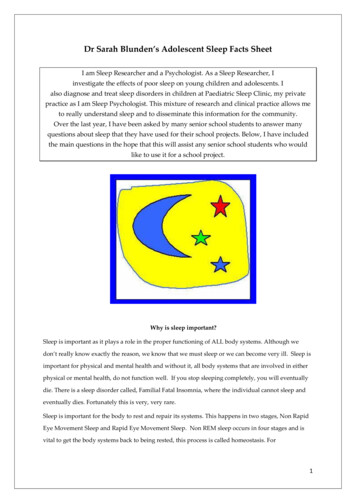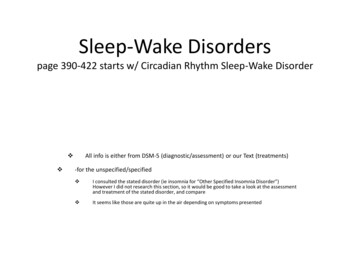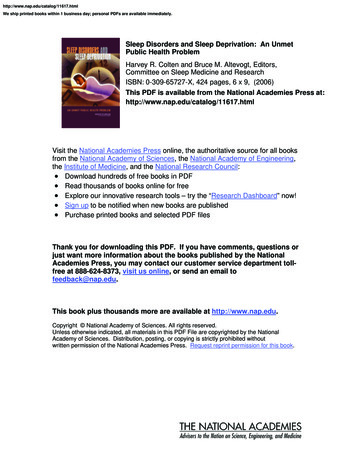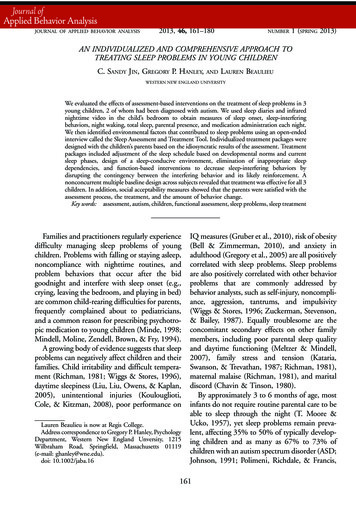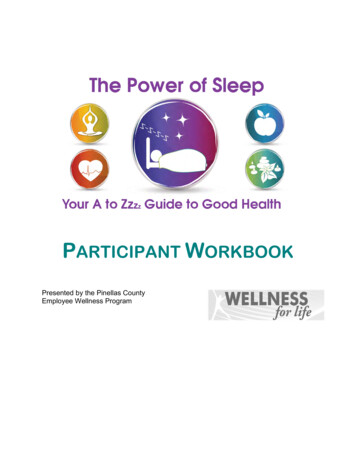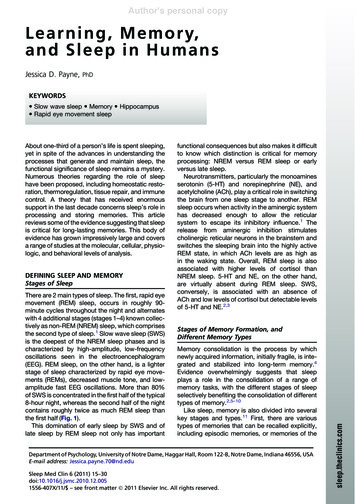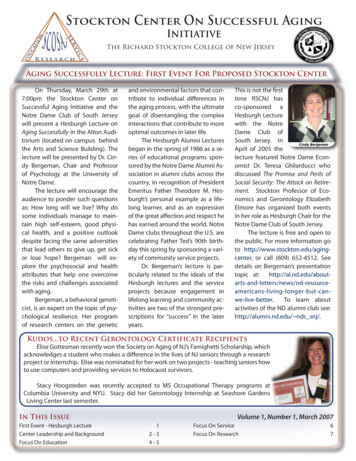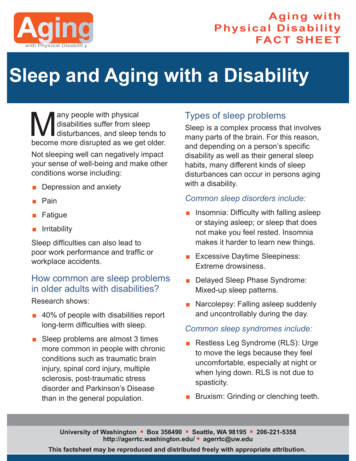
Transcription
with Physical Disabilit yAging withPhysical DisabilityFA C T S H E E TSleep and Aging with a DisabilityMany people with physicaldisabilities suffer from sleepdisturbances, and sleep tends tobecome more disrupted as we get older.Types of sleep problems Depression and anxietySleep is a complex process that involvesmany parts of the brain. For this reason,and depending on a person’s specificdisability as well as their general sleephabits, many different kinds of sleepdisturbances can occur in persons agingwith a disability. PainCommon sleep disorders include: Fatigue Insomnia: Difficulty with falling asleepor staying asleep; or sleep that doesnot make you feel rested. Insomniamakes it harder to learn new things.Not sleeping well can negatively impactyour sense of well-being and make otherconditions worse including: IrritabilitySleep difficulties can also lead topoor work performance and traffic orworkplace accidents. Excessive Daytime Sleepiness:Extreme drowsiness.How common are sleep problemsin older adults with disabilities? Delayed Sleep Phase Syndrome:Mixed-up sleep patterns.Research shows: Narcolepsy: Falling asleep suddenlyand uncontrollably during the day. 40% of people with disabilities reportlong-term difficulties with sleep. Sleep problems are almost 3 timesmore common in people with chronicconditions such as traumatic braininjury, spinal cord injury, multiplesclerosis, post-traumatic stressdisorder and Parkinson’s Diseasethan in the general population.Common sleep syndromes include: Restless Leg Syndrome (RLS): Urgeto move the legs because they feeluncomfortable, especially at night orwhen lying down. RLS is not due tospasticity. Bruxism: Grinding or clenching teeth.University of Washington n Box 356490 n Seattle, WA 98195 n 206-221-5358http://agerrtc.washington.edu/ n agerrtc@uw.eduThis factsheet may be reproduced and distributed freely with appropriate attribution.
with Physical Disabilit yAGING WITH PHYSICAL DISABILITY FACT SHEET SERIES Sleep Apnea: Brief pauses inbreathing during sleep, resulting inreduced oxygen flow to the brain andcausing loud snoring and frequentawakening.Daytime sleeping (napping) andphysical inactivity: Napping during the Periodic limb movement disorder(PLMD): Involuntary movement of legsand arms during sleep.Pain: Many people with physical Sleepwalking: Walking or performingother activities while sleeping and notbeing aware of it. Post-Traumatic Hypersomnia:Sleeping many hours more thannormal.What causes sleep problems?Sleep problems can be caused by manydifferent factors, including physicaland chemical changes associated withdisabilities and the aging process.Physical and chemical changesassociated with injury and aging:The “internal clock” in the brain controlswhen people sleep and wake every day.For individuals who have a disabilityassociated with a brain injury or ongoingnervous system lesions like multiplesclerosis, their brain may be less able totell the body to fall asleep or wake up.Injuries to the brain can also affect thechemicals in our body that help us tosleep, and brain mechanisms for startingand stopping sleep.Changes in breathing control:Sometimes the brain’s ability to controlbreathing during sleep becomes alteredafter an injury, or because of weight gainassociated with inactivity, resulting insleep apnea.day is likely to disturb sleep at night.Inactivity or lack of exercise can alsoworsen sleep.disabilities also experience chronicpain. This discomfort may disturb sleep.Medications taken to relieve pain mayalso affect sleep.Depression and anxiety: Depressionis more common in persons withdisabilities than in the general population.Also, we know that signs of distressand depression tend to increase aspeople with disabilities age from youngadulthood (18 to 44 years old) intomiddle age (45 to 64 years old), althoughwe also often see improvement indepression as people age from middleage into older ages (65 years and older).Sleep problems such as difficulty fallingasleep and early morning waking arecommon symptoms of depression,anxiety, and other mood problems.Alcohol: While alcohol may help bring onsleep, drinking alcohol before bedtime islikely to interfere with normal sleep ratherthan improve it. As a result, people whodrink alcohol to help them get to sleepare at greater risk to wake up in themiddle of the night, and to not feel restedin the morning.Caffeine and nicotine: Nicotine fromtobacco may cause sleep disturbancesand is often overlooked. Caffeine candisturb sleep when consumed in theafternoon or evening. Many soft drinkscontain excessive amounts of caffeine.Page 2 of 5
with Physical Disabilit yAGING WITH PHYSICAL DISABILITY FACT SHEET SERIESMedications: A number of medicationstaken to treat other conditions, such aspain or anxiety, can also alter a person’sability to get to sleep or stay asleep.Other medications can make peoplesleepy during the day and unable toparticipate in activities.If you have concerns about how yourmedication is affecting your sleep, consultyour health care provider to discussalternatives. Prescription drugs for treating asthmaand depression may cause insomnia. Some prescribed stimulants that aremeant to treat daytime sleepiness cancause insomnia if taken too close tobedtime. This can often be avoided byadjusting the timing of the medication Most over-the-counter sleep aidmedications contain an antihistamine(commonly diphenhydramine) andare not recommended for peoplewith brain-related disabilities (e.g.,traumatic brain injury, multiplesclerosis) because they may causedisturbances in memory and newlearning. Many prescription “sleep medications”are recommended to be used only forthe short term (about two weeks atmost) to help someone sleep duringa stressful time, such as while in thehospital. Sleep medications are notapproved for use by the FDA for longterm management of sleep becausethey can actually worsen sleepproblems over time.How can sleep medications cause longterm sleep problems?Although sleep medications can helpyou to get to sleep at night, they disruptthe sleeping cycle and interfere with thebody’s ability to achieve deep and restfulsleep.Many sleep medications are alsoaddictive and your body builds atolerance to them. This is especially trueof the benzodiazapines, such as Xanax ,Librium , Valium and Ativan .If you are taking a strong sedative forsleep, you should talk to your healthcare provider about tapering it. Gettingoff these drugs must be done graduallyand with medical supervision. Stoppingabruptly can be very dangerous.What can be done to improvesleep?Changes in behavior and environmentare the first step to treating sleepdifficulties. If you live with others, youmay want to discuss ways that they canhelp you improve your sleep.Daytime Suggestions Set an alarm to wake up at about thesame time every day. Include meaningful activities in yourdaily schedule. Get off the couch and limit TVwatching. Exercise every day. People withdisabilities who exercise regularlyreport fewer sleep problems. Thiseffect may be due, at least in part, tothe known benefits of regular exercisePage 3 of 5
with Physical Disabilit yAGING WITH PHYSICAL DISABILITY FACT SHEET SERIESon reducing depression and anxiety.See the factsheet on Exercise forOlder Adults with a Disability to learnmore. Create a restful atmosphere in thebedroom, protected from distractions,noise, extreme temperatures andlight. Get outdoors for some sunlight duringthe daytime. If you live in an area withless sun in the wintertime, considerusing light box therapy. If you go to bed and don’t fall asleepin 20 minutes, get out of bed and dosomething relaxing or boring until youfeel sleepy. Limit napping to no more than 20minutes during the day.Talk to your health care providerNighttime Suggestions Go to bed at about the same timeevery night. Follow a bedtime routine. Forexample, put out your clothes formorning, brush your teeth and thenread or listen to relaxing music for 10minutes before turning out the light. Avoid caffeine, nicotine, alcohol andsugar for at least five hours beforebedtime. Avoid eating prior to sleep to allowtime to digest, but also do not go tobed hungry, as this can also wake youfrom sleep. Do not exercise within two hours ofbedtime but stretching, meditation, ora warm bath before bed may help withsleep. Do not eat or watch TV while in bed. Keep stress out of the bedroom. Forexample, do not work or pay billsthere.If your sleep problems persist, talk to yourhealth care provider to explore safe andeffective solutions. Evaluation of sleepproblems should include a thoroughhistory of such problems, medicationreview, an assessment of your bedtimeroutines, and a comprehensive medicalevaluation.Before recommending any action, yourhealth care provider will explore withyou a variety of possible causes foryour sleep problems, including pain ordepression. If necessary, he or she mayrecommend a sleep test (also known asa polysomnographic evaluation or sleeplab). Based on your symptoms, medicalhistory and specific needs, your healthcare provider will be able to make apersonalized treatment plan to help youachieve restful sleep.Treatment optionsNon-pharmacological therapies If mood or emotional issues suchas anxiety or depression arecausing sleep difficulties, counseling(psychotherapy) may be anappropriate treatment.Page 4 of 5
AGING WITH PHYSICAL DISABILITY FACT SHEET SERIES Sleep restriction may improvesleeping patterns by restricting thenumber of hours spent in bed to theactual number of hours slept. For those with anxiety, relaxationtherapy and meditation exercises canhelp create a restful environment bothin your bedroom and in your body andmind. Use of special bright lights(phototherapy) has been shown instudies to help promote sleep. Whenexposed to these lights at strategictimes in the day, you may be ableto sleep more at night. Consult withyour doctor first, as these bright lightscan sometimes cause eyestrain andheadaches.MedicationsAsk your health care provider aboutmedications that can help you sleepthrough the night or keep you awakeduring the day.Special care is necessary when choosinga medication in order to avoid daytimesedation or worsening of cognitive andbehavior problems.Natural remediesSome consumers have found herbal teas,melatonin and valerian useful for sleepproblems, and these are sold in healthfood and drug stores with no prescriptionneeded. However, these remedies havemultiple drug interactions, and you shouldtell your health care provider if you areusing them.Recommended readings andresourcesBrain Basics: Understanding Sleep –NINDS/NIH. http://www.ninds.nih.gov/disorders/brain basics/understandingsleep.htmUniversity of Maryland Sleep Hygiene:Helpful Hints to Help You Sleep. http://www.umm.edu/sleep/sleep hyg.htmDisclaimerThis information is not meant to replace theadvice from a medical professional. Youshould consult your health care providerregarding specific medical concerns ortreatment.AuthorshipContent is based on research evidenceand/or professional consensus of facultyat the University of Washington Aging andPhysical Disability Rehabilitation Researchand Training Center (AGERRTC). Thisfactsheet was based in large part on asimilar fact sheet entitled, Sleep and TBIdeveloped by Brian Greenwald, MD andKathleen Bell, MD in collaboration withthe Model System Knowledge TranslationCenter, and from two columns about sleepand aging with disabilities developed byKara McMullen in collaboration with theAGERRTC investigators. This factsheet maybe reproduced and distributed freely with thefollowing attribution: Jensen, MP and Terrill,A. (2012). Sleep and Aging with Disabilities[Factsheet]. Aging and Physical DisabilityRehabilitation Research and Training Center.NIDRR/U.S. D.O.E. grant #H133B080024.University of Washington. http://agerrtc.washington.edu/This factsheet was developed under a grant from the Department of Education, NIDRR grant number H133B080024. However, those contents donot necessarily represent the policy of the Department of Education, and you should not assume endorsement by the Federal Government.Copyright 2012 University of Washington, Aging and Physical Disability Rehabilitation Research and Training Center. All Rights Reserved.
disabilities and the aging process. Physical and chemical changes associated with injury and aging: The "internal clock" in the brain controls when people sleep and wake every day. For individuals who have a disability associated with a brain injury or ongoing nervous system lesions like multiple sclerosis, their brain may be less able to

